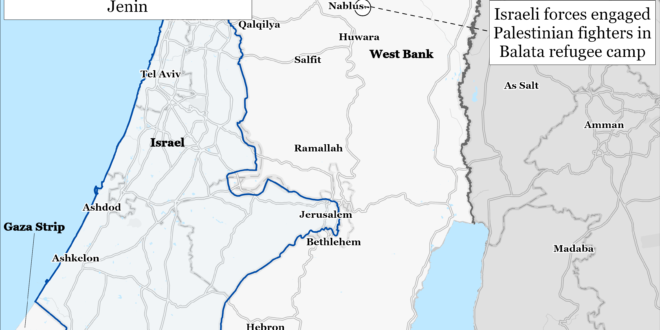Hamas issued new demands in the ceasefire negotiations with Israel on June 11. Hamas made the demands in response to the latest Israeli ceasefire proposal.[i] The demands include determining timelines for a permanent ceasefire and the complete withdrawal of Israeli forces from the Gaza Strip. An unspecified senior Biden administration official said Hamas requested greater specificity in the proposal that would undermine the phased nature of the proposal. US Secretary of State Antony Blinken said on June 12 that Hamas’ new demands go beyond its previous negotiating position.[ii] Blinken said that the issues Hamas raised are “bridgeable” but questioned whether Hamas is acting in good faith in the negotiations.[iii] The Israeli proposal includes provisions to meet Hamas’ maximalist demands but does not guarantee them. Israeli officials have framed Hamas’ new demands as tantamount to a rejection of the Israeli proposal.[iv]
Hamas portrayed its response to the latest Israeli ceasefire proposal as a technical iteration rather than an outright rejection likely to frame Israel as the party that is obstructing ceasefire talks. Hamas has repeatedly framed its participation in the negotiations as positive and productive.[v] This framing ignores that Hamas has refused to change its maximalist demands or grant any concessions since December 2023 and is now making new demands. Senior US officials, including President Joe Biden, have stated in recent weeks that Hamas remains the primary obstacle to a ceasefire agreement.[vi] Hamas’ mis-framing is meant to force Israel to either accept the new demands or risk being perceived as the party that ended ceasefire negotiations. Israeli officials have indicated repeatedly that their latest proposal is the last one that they will make.[vii]
Hamas feels that it can manipulate the ceasefire negotiations in this manner because it is confident that it can survive the Gaza Strip. Senior Hamas officials have repeatedly expressed confidence that Hamas will survive the war, despite Israeli military pressure.[viii] Hamas forces throughout the Gaza Strip remain combat effective and are trying to reconstitute. Hamas has also begun trying to reassert its political authority in some parts of the strip.[ix] Hamas has achieved this success by exploiting the fact that Israeli forces withdraw from areas in the Gaza Strip after clearing them rather than conducting follow-on holding operations.
The Israel Defense Forces (IDF) killed a senior Lebanese Hezbollah commander and three other Hezbollah fighters in an airstrike in southern Lebanon on June 11.[x] The IDF said that the commander, Taleb Sami Abdullah, was one of the seniormost Hezbollah commanders in southern Lebanon and responsible for attacks into northern Israel.[xi] Abdullah commanded Hezbollah’s Nasr unit, which is one of three regional commands in southern Lebanon along the border with Israel.[xii] Images of Abdullah alongside IRGC Quds Force commanders Qassem Soleimani and Esmail Ghaani appeared after his death.[xiii][xiv]
Hezbollah launched over 200 mortars and rockets into northern Israel on June 12 in response to the killing of Abdullah.[xv] The attack marks the largest that Hezbollah has conducted into Israel since the war began.[xvi] The IDF said that the attack caused fires but no casualties.[xvii] Senior Hezbollah official Hashem Safieddine threatened to increase the rate and scale of attacks into northern Israel in response to the killing of Abdullah.[xviii]
Hezbollah has continued almost daily attacks into northern Israel since October 2023, despite the IDF killing several Hezbollah commanders throughout the war. Israeli Defense Minister Yoav Gallant stated in April 2024 that the IDF has killed around half of Hezbollah’s field commanders in southern Lebanon. The IDF also killed a senior officer in Hezbollah’s Radwan special forces in January 2024. Hezbollah has nevertheless sustained and even intensified in some cases its direct and indirect fire attacks into northern Israel.
Iranian Parliament Speaker Mohammad Bagher Ghalibaf is framing his candidacy in the presidential election around improving the Iranian economy. Ghalibaf has discussed in recent days the need to improve economic conditions in Iran and chose “service and progress” as his campaign slogan.[xix] Ghalibaf also emphasized the need to increase production in the automotive, energy and housing industries and advocated against price fixing.[xx] Ghalibaf affirmed that he will implement the seventh five-year development plan, which is a Raisi-era document focused partly on curbing inflation, optimizing the state budget, and resolving government debts.[xxi] Ghalibaf’s emphatic support for the five-year development plan indicates that he is trying to frame his candidacy as least partly as a continuation of the policies of late-President Ebrahim Raisi.
Ghalibaf appointed Ali Nikzad—a hardline, ethnically Azeri parliamentarian—as his campaign manager on June 10.[xxii] Nikzad previously worked in Raisi’s presidential campaigns in 2017 and 2021.[xxiii] An Iranian opposition outlet suggested that Ghalibaf hired Nikzad to garner support from the Iranian Azeri population and rural, conservative communities. The outlet also suggested that hiring Nikzad could be meant to balance against reformist candidate Masoud Pezeshkian, who is an ethnic Azeri as well. Nikzad and Pezeshkian have both represented heavily Azeri constituencies in Parliament.
The Houthis attacked and disabled a commercial vessel in the Red Sea on June 12.[xxiv] The Houthis struck the vessel with an unmanned surface vehicle and again with an “unknown airborne projectile.”[xxv] The crew lost control of the vessel due to the damage. Maritime security firms identified the vessel as the Liberian-flagged, Greek-owned Tutor, which was sailing to India.[xxvi] The Houthis claimed responsibility for the attack and alleged that they used drones, missiles, and an unmanned surface vehicle.[xxvii]
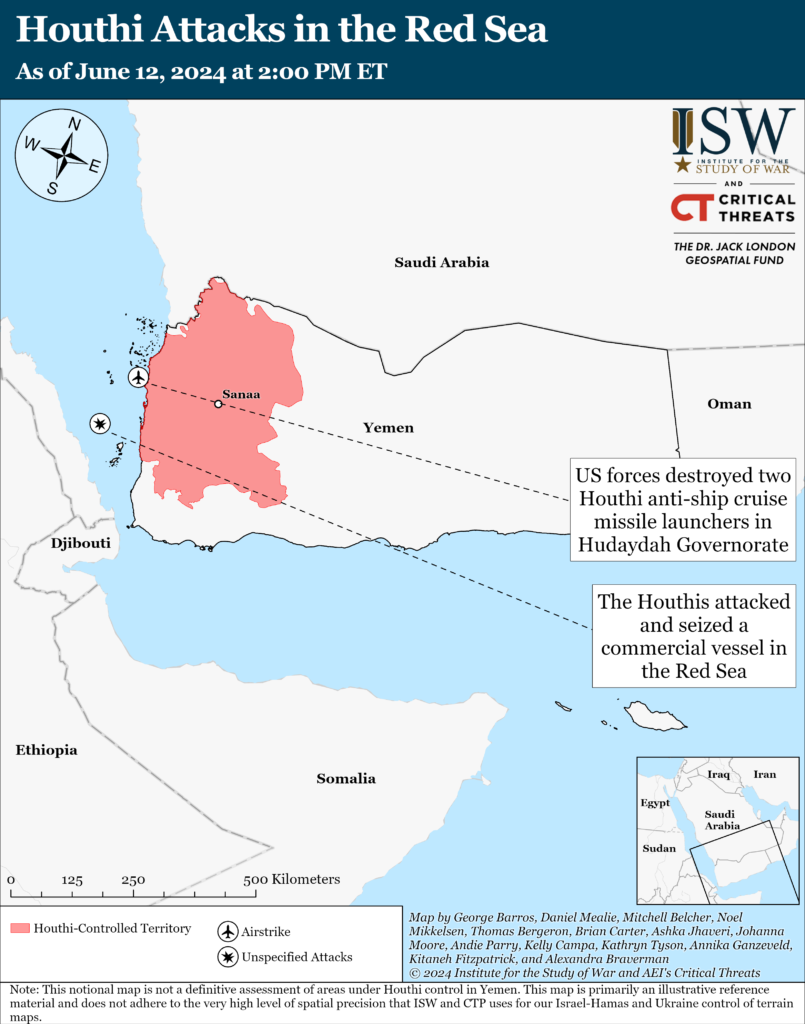
Key Takeaways:
- Gaza Strip: Hamas issued new demands in the ceasefire negotiations with Israel. Hamas portrayed its new demands as technical iteration rather than an outright rejection of the proposal likely to frame Israel as the party that is obstructing ceasefire talks.
- Southern Lebanon and Golan Heights: The IDF killed a senior Lebanese Hezbollah commander in an airstrike in southern Lebanon. Hezbollah responded by launching over 200 mortars and rockets into northern Israel.
- Iran: Iranian Parliament Speaker Mohammad Bagher Ghalibaf is framing his candidacy in the presidential election around improving the Iranian economy.
- Yemen: The Houthis attacked and disabled a commercial vessel in the Red Sea. The Houthis claimed to use drones, missiles, and an unmanned surface vehicle.
- Iraq: The Islamic Resistance in Iraq claimed a drone attack targeting Eilat.
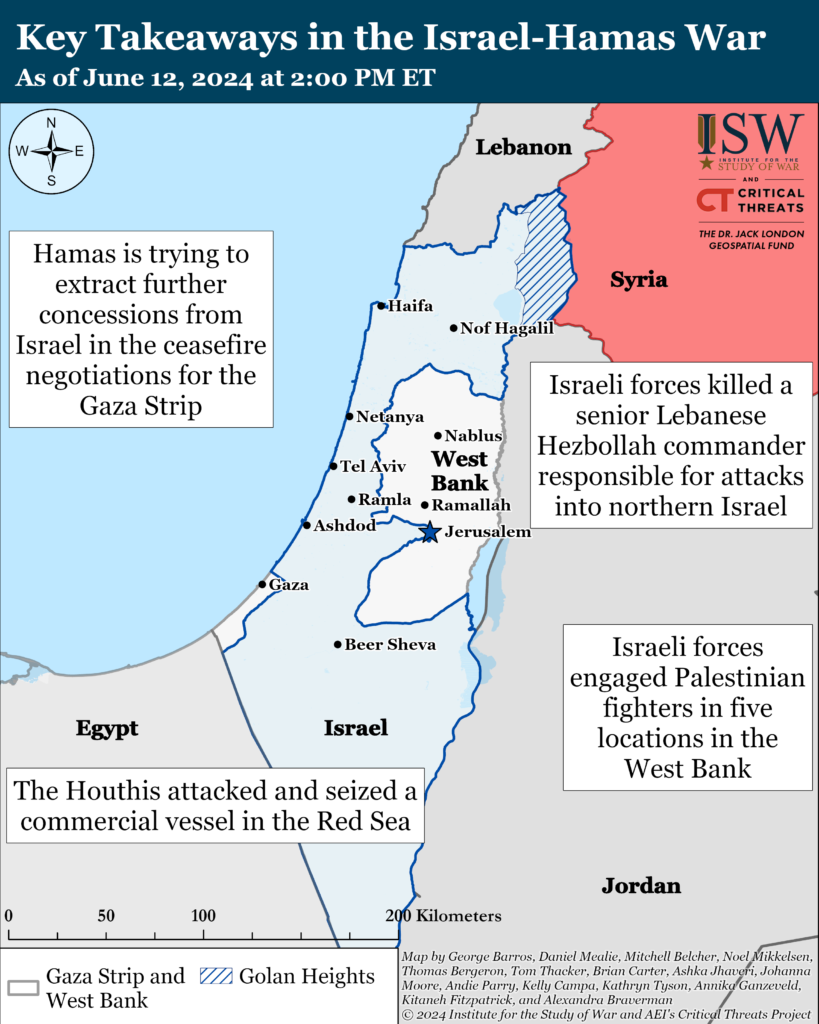
Gaza Strip
Axis of Resistance objectives:
Erode the will of the Israeli political establishment and public to sustain clearing operations in the Gaza Strip
Reestablish Hamas as the governing authority in the Gaza Strip
The IDF 99th Division continued to operate along the Netzarim Corridor, south of Gaza City, on June 12.[xxviii] Palestinian militias fired mortars and rockets at Israeli forces along the corridor.[xxix]
The IDF 162nd Division continued to operate in several sectors of Rafah on June 12. The IDF Givati Brigade has operated in Shaboura neighborhood in Rafah in recent days.[xxx] Israeli forces engaged Palestinian fighters, directed airstrikes, and destroyed explosively rigged structures.[xxxi] Palestinian militias conducted several attacks targeting Israeli forces in Rafah using mortars and rocket-propelled grenades.[xxxii]
The International Committee of the Red Cross (ICRC) in Rafah said on June 12 that Israel informed it that fighting will continue in western Rafah.[xxxiii] The ICRC said it does not have specific information regarding Israeli military activities.[xxxiv] The IDF had not issued any new evacuation orders in Rafah at the time of this writing. CNN obtained footage of civilians leaving al Alam in western Rafah following a warning of a pending military operation.[xxxv] A Palestinian activist reported that the IDF issued warnings to people in al Alam of a military operation in the next 24 hours.[xxxvi]
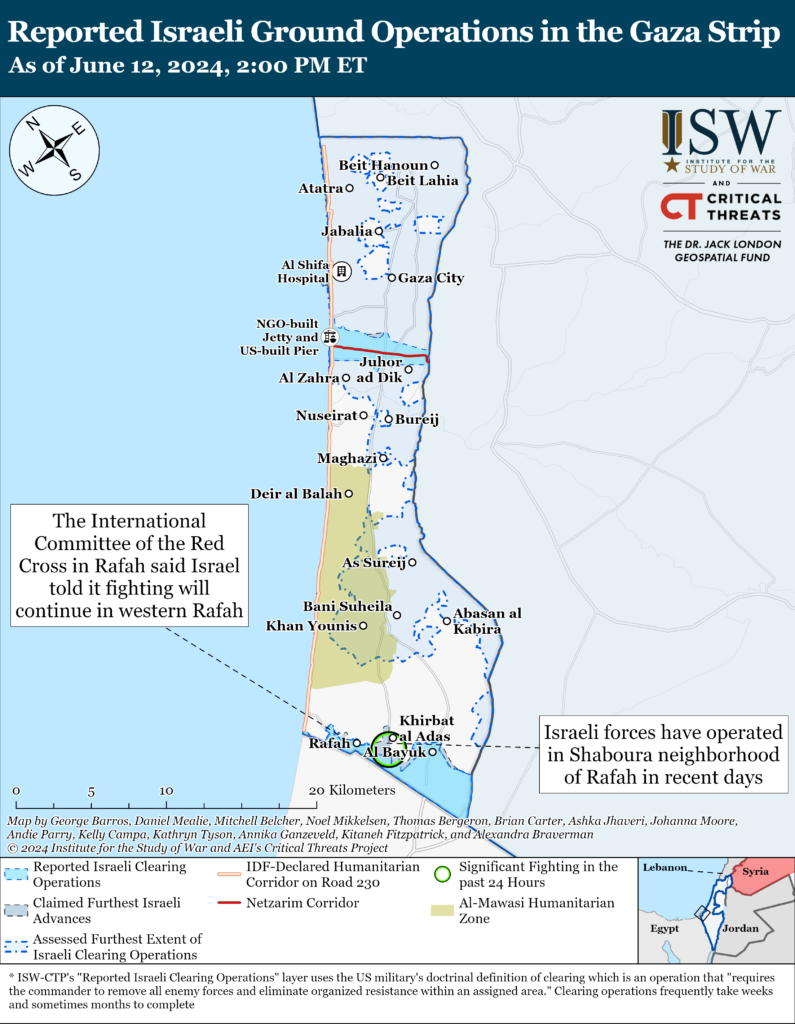
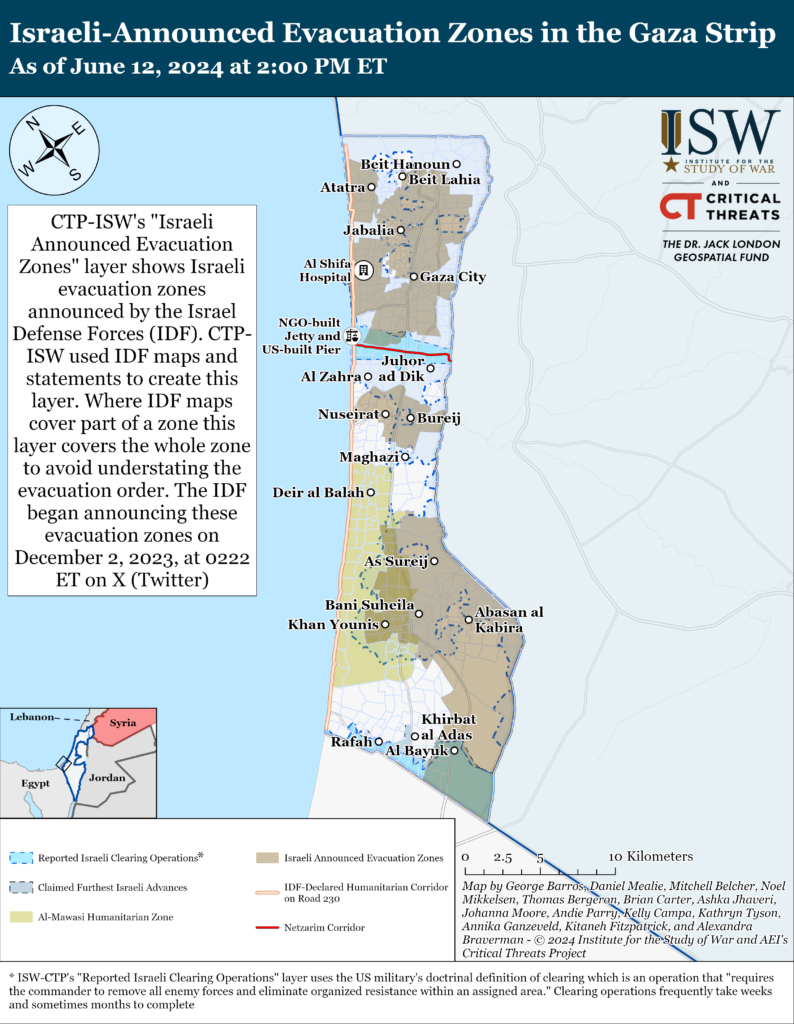
Palestinian militias conducted three indirect fire attacks from the Gaza Strip into Israel on June 12. Three Palestinian militias targeted an IDF site in Nahal Oz.[xxxvii]
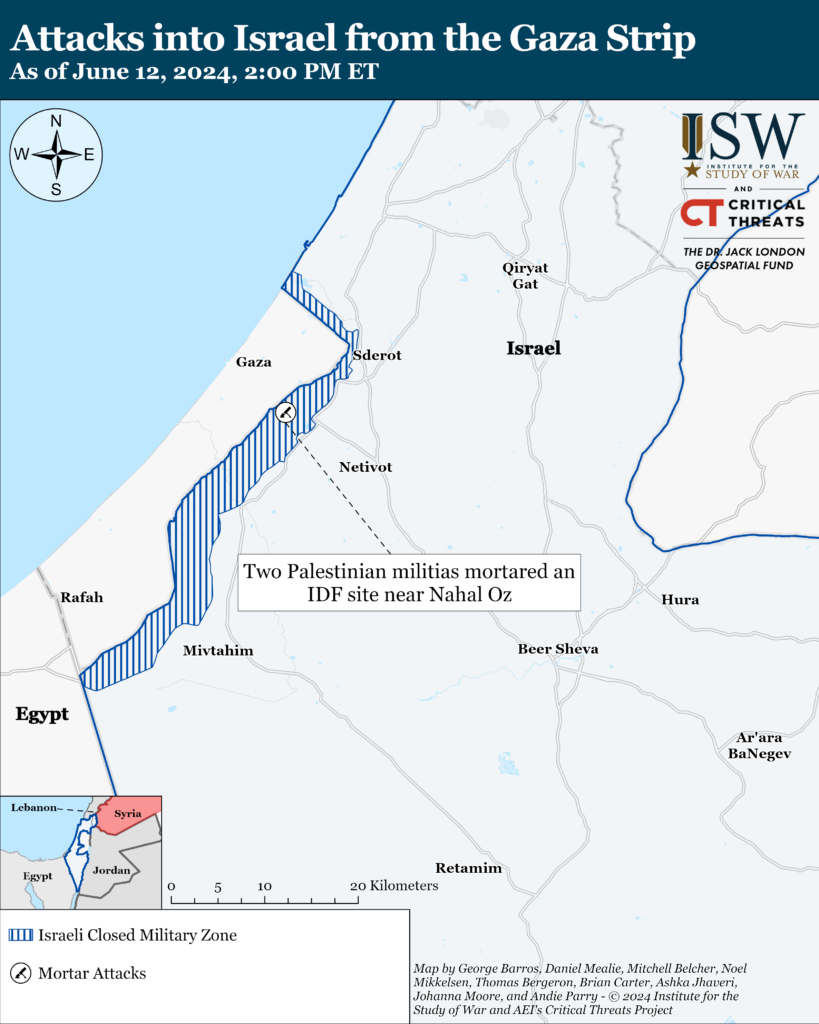
Recorded reports of attacks; CTP-ISW cannot independently verify impact.
West Bank
Axis of Resistance objectives:
Establish the West Bank as a viable front against Israel
Israeli forces have engaged Palestinian fighters in at least five locations in the West Bank since CTP-ISW’s last data cutoff on June 11.[xxxviii] The al Aqsa Martyrs‘ Brigades fired small arms and detonated IEDs targeting Israeli forces in two areas near Jenin.[xxxix]
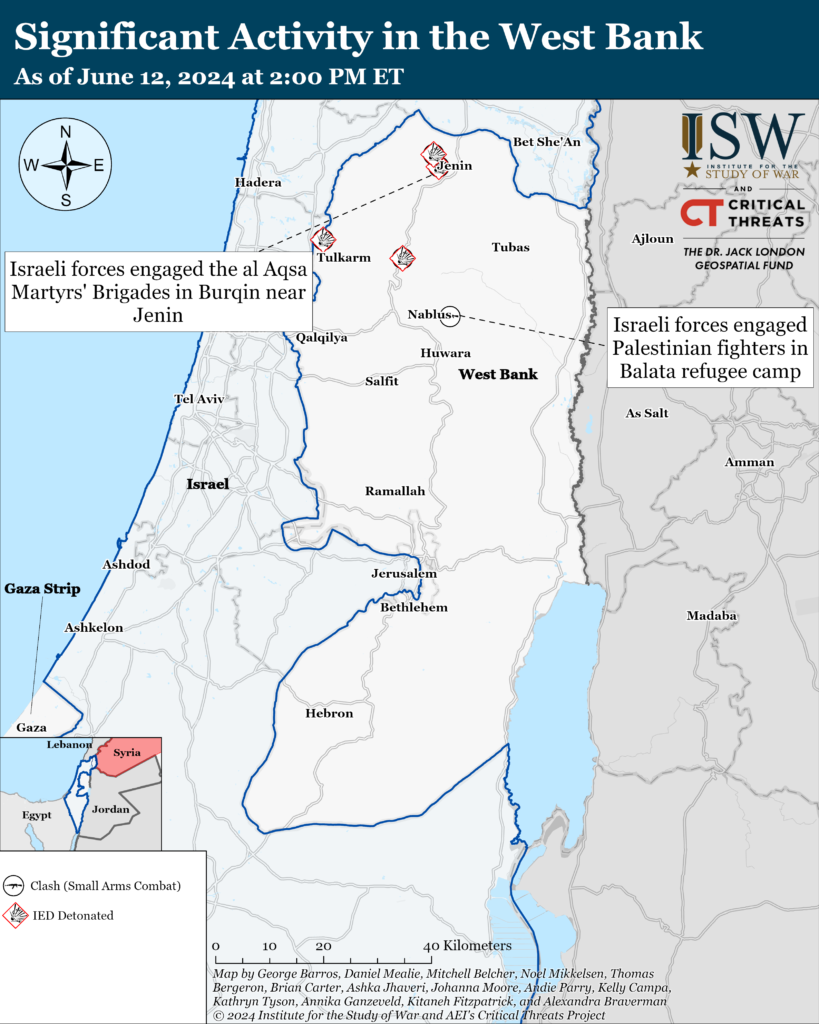
This map is not an exhaustive depiction of clashes and demonstrations in the West Bank.
Southern Lebanon and Golan Heights
Axis of Resistance objectives:
Deter Israel from conducting a ground operation into Lebanon
Prepare for an expanded and protracted conflict with Israel in the near term
Expel the United States from Syria
See topline section.
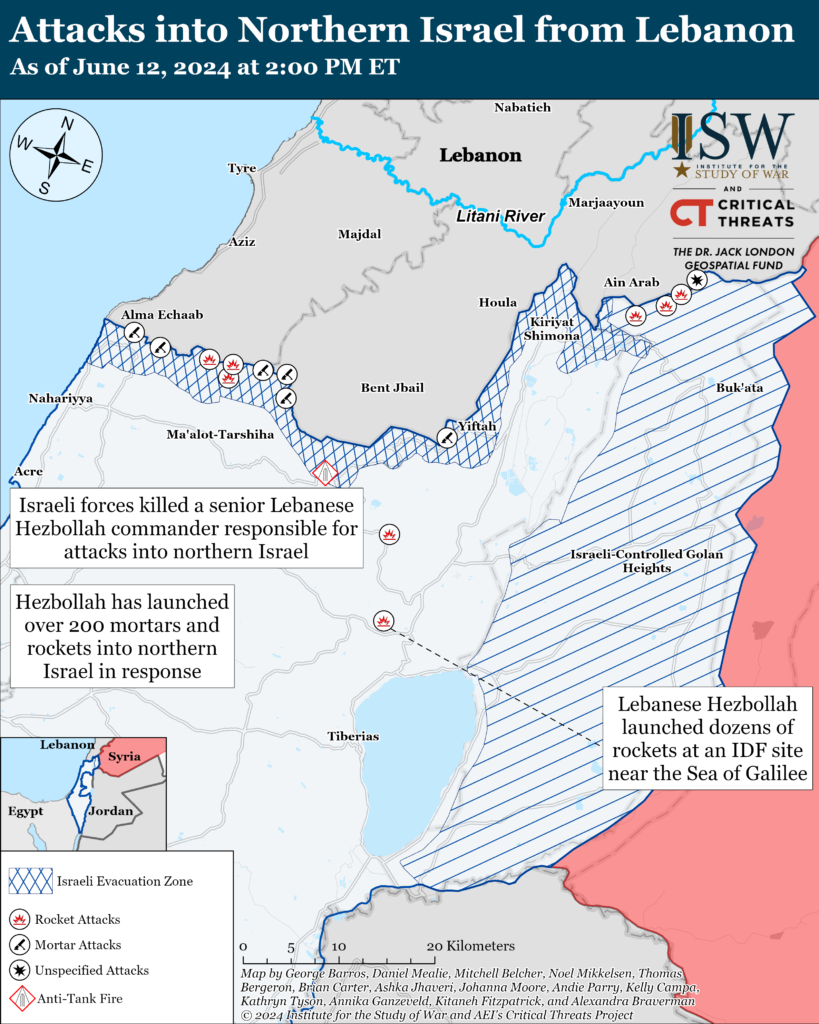
Recorded reports of attacks; CTP-ISW cannot independently verify impact.
Iran and Axis of Resistance
The Islamic Resistance in Iraq—a coalition of Iranian-backed Iraqi militias—claimed a drone attack targeting an unspecified “vital target” in Eilat, Israel, on June 11.[xl] Israeli officials and media have not commented on the attack at the time of this writing.
Iraqi Prime Minister Mohammad Shia al Sudani met with US Secretary of State Antony Blinken on the sidelines of a humanitarian aid conference in Amman, Jordan, on June 11.[xli] Sudani and Blinken discussed the development of US-Iraqi relations since Sudani’s April 2024 visit to the United States and the latest Israeli ceasefire proposal.[xlii] Blinken appreciated Iraq’s support for the proposal and called on Hamas to accept the proposal “without further delay.”[xliii]
Faylaq al Waad al Sadiq Secretary General Mohammad al Tamimi attended a Russia Day celebration at the Russian Embassy in Baghdad on June 11.[xliv] Russian Ambassador to Iraq Elbrus Kutrashev also attended the event.[xlv] Kutrashev has met with several senior Iraqi political and military officials, including Popular Mobilization Commission Chairman Faleh al Fayyadh, since late January 2024.[xlvi] Tamimi has given several interviews with Russian media in recent months in which he emphasized the need to remove US forces from Iraq.[xlvii]
The Iraqi Foreign Affairs Ministry criticized the US State Department on June 11 for attributing recent attacks on US and UK businesses in Iraq to the Popular Mobilization Forces (PMF).[xlviii] The ministry claimed that outlaws with no affiliation to the PMF committed the attacks that occurred between late May 2024 and June 3.[xlix] US State Department spokesperson Matthew Miller previously expressed concern on June 6 that Iraqi Prime Minister Mohammad Shia al Sudani does not have full control over the PMF.[l] CTP-ISW previously assessed that Iran has infiltrated the PMF extensively and uses it to exert significant influence in Iraq.[li]
US CENTCOM destroyed two Houthi anti-ship cruise missile launchers in Yemen on June 11.[lii] Houthi-affiliated media reported that the strikes occurred in al Salif in the Hudaydah Governorate.[liii]
Some Iranian reformists criticized reformist presidential candidate Masoud Pezeshkian’s campaign approach. Reformist politician Mohammad Ali Abtahi criticized Pezeshkian on June 12 for selecting members of the Mohammad Khatami and Mir Hossein Mousavi administrations to manage his campaign.[liv] Abtahi stated that these individuals are disconnected from Iran’s younger generation and emphasized that individuals managing a political campaign must be able to engage in dialogue with society.[lv] Some reformists have also criticized Pezeshkian for insufficiently promoting reformist ideas and policies during his first televised interview on June 10.[lvi] Reform Front spokesperson Javad Imam suggested on June 11 that Pezeshkian should focus less on appealing to hardline voters and instead remain true to the reformist agenda.[lvii] CTP-ISW assessed on June 11 that Pezeshkian is trying to balance promoting a reformist agenda while maintaining the approval of Supreme Leader Ali Khamenei.[lviii]
Iranian Judiciary Chief Gholam Hossein Mohseni Ejei met with senior Qatari officials in Doha on June 12. Ejei called on the Qatar to either extradite or grant amnesty to Iranian prisoners in Qatar during a meeting with Qatari Emir Sheikh Tamim bin Hamad al Thani.[lix] Ejei also called on the Qatar to allow Iranian prisoners to communicate with their families during a meeting with the head of Qatar’s Supreme Judicial Council.[lx] Iranian Justice Minister Amin Hossein Rahimi, who traveled to Doha with Ejei, signed an agreement with the Qatari attorney general to increase “legal assistance in criminal matters.”[lxi] Ejei announced upon returning to Iran on June 12 that Iran and Qatar signed a memorandum of understanding to increase judicial cooperation and that he discussed the Israel-Hamas war, the “intelligentization of judicial processes,” and cyber cooperation with Qatari officials.[lxii]
Acting Iranian Foreign Affairs Minister Ali Bagheri Kani met with his Venezuelan and Thai counterparts on the sidelines of the BRICS foreign affairs ministers meeting in Nizhny Novgorod, Russia, on June 12.[lxiii] Bagheri Kani and his Venezuelan counterpart discussed cooperation to counter US sanctions.[lxiv]
 Eurasia Press & News
Eurasia Press & News
